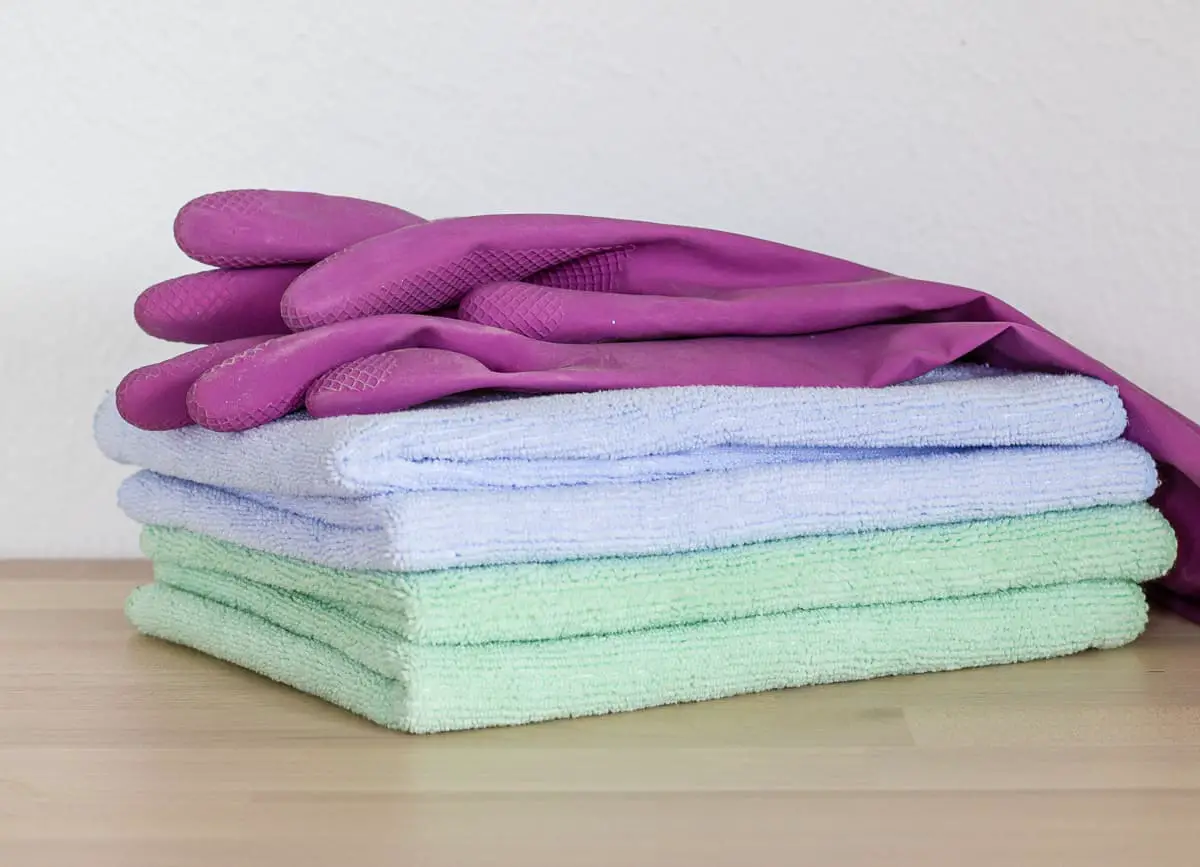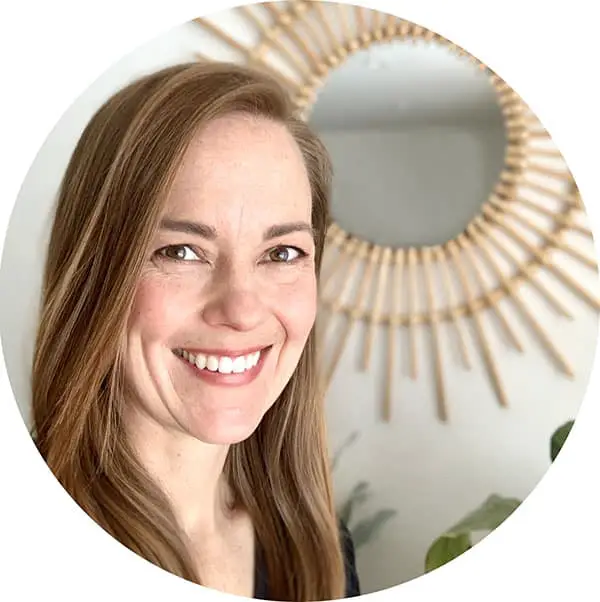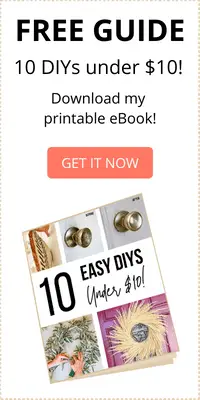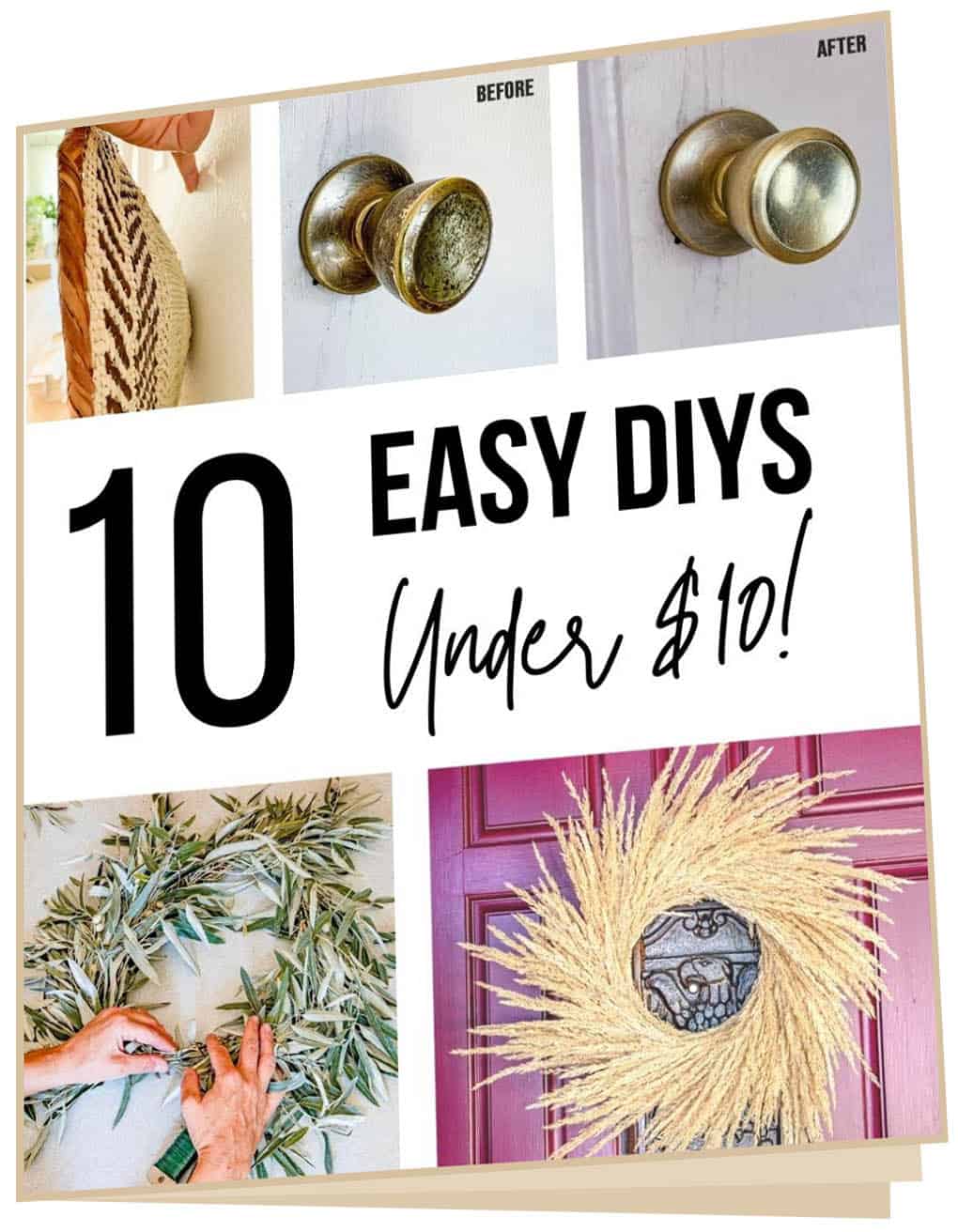I’ve made my fair share of DIY natural cleaners over the years, and today I’m sharing which recipes actually work. If you’ve wondered… is vinegar the true non-toxic miracle worker? Can essential oil cleaners disinfect? Is it really possible to make one year’s supply of laundry detergent for $20? Pinterest would have you believe all of these claims. However, I’ve learned through research + trial and error that some of these “natural” homemade recipes work and others are duds. I’ve got a LOT to say on this topic, so grab a coffee and read on!
DISCLAIMER: I am not a scientist. I have done a lot of reading about ingredients and products, but I am not claiming to be an expert on this topic. I encourage you to do your own research from credible sources, not just from random sites. Also, this post has nothing to do with COVID-19; please refer to the CDC website on that topic. Consumer Reports also published this related article about disinfectants.
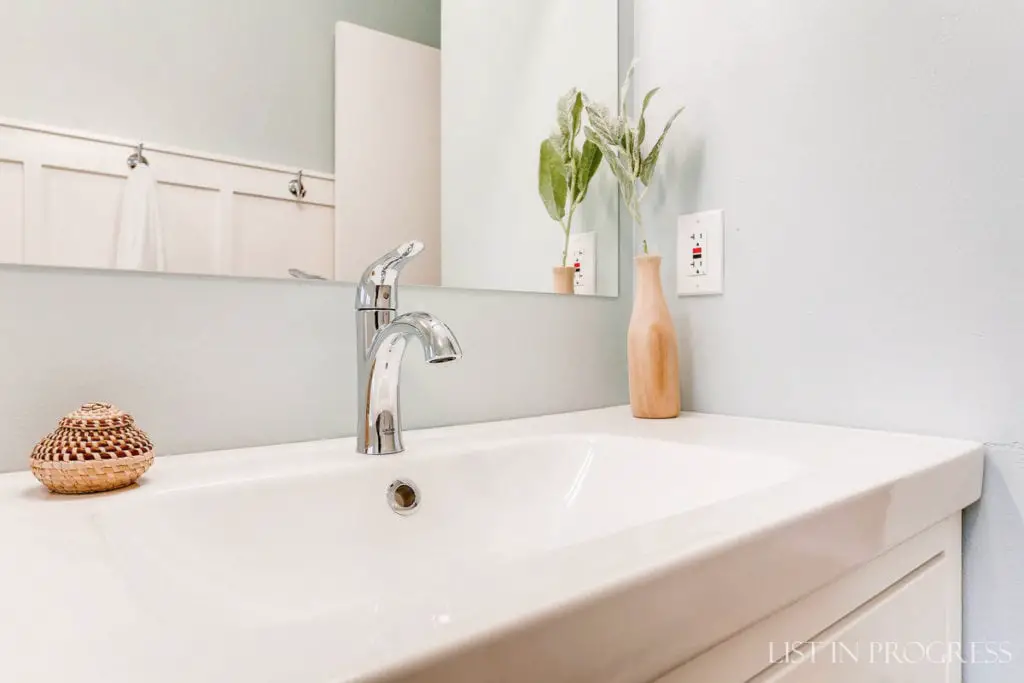
Why Use DIY Natural Cleaners?
Let’s start here. Why does this matter to you? Do you need to avoid certain chemical ingredients due to health reasons or allergies? Are you concerned about research linking parabens to cancer? Or are you trying to save money by making your own DIY cleaning products? Natural alternatives to so-called “harsh chemicals” are a booming business, but not all natural alternatives are worth the switch (and not all chemicals are evil). I encourage you to research your specific concerns first.
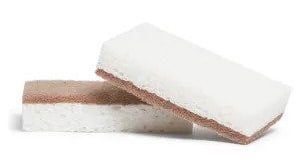
What is So Bad About Traditional Cleaners?
Probably nothing. Seriously! I’m not here to get on a soapbox (ha!) and tell you to stop using this or that.
However, I can tell you that these are some of the heavy hitters that the DIY natural/homemade community avoids:
* Parabens – parabens are a common preservative in personal care products and cleaners. Possibly linked to cancer, but there is actually no causal evidence.
* Sodium Lauryl Sulfate – this surfactant creates foam to help wash away dirt. It could potentially irritate skin and is falsely identified as a carcinogen.
* Petrolatum – petroleum jelly is a moisturizing agent derived from petroleum (and a byproduct of oil refining).
* Fragrance – flagged simply because it COULD be harmful, since ingredients are not specifically identified.
Here is a longer list of potentially scary ingredients. Just in case you want justification to throw out everything in your bathroom cabinet. I’m kidding! Please don’t and keep reading…
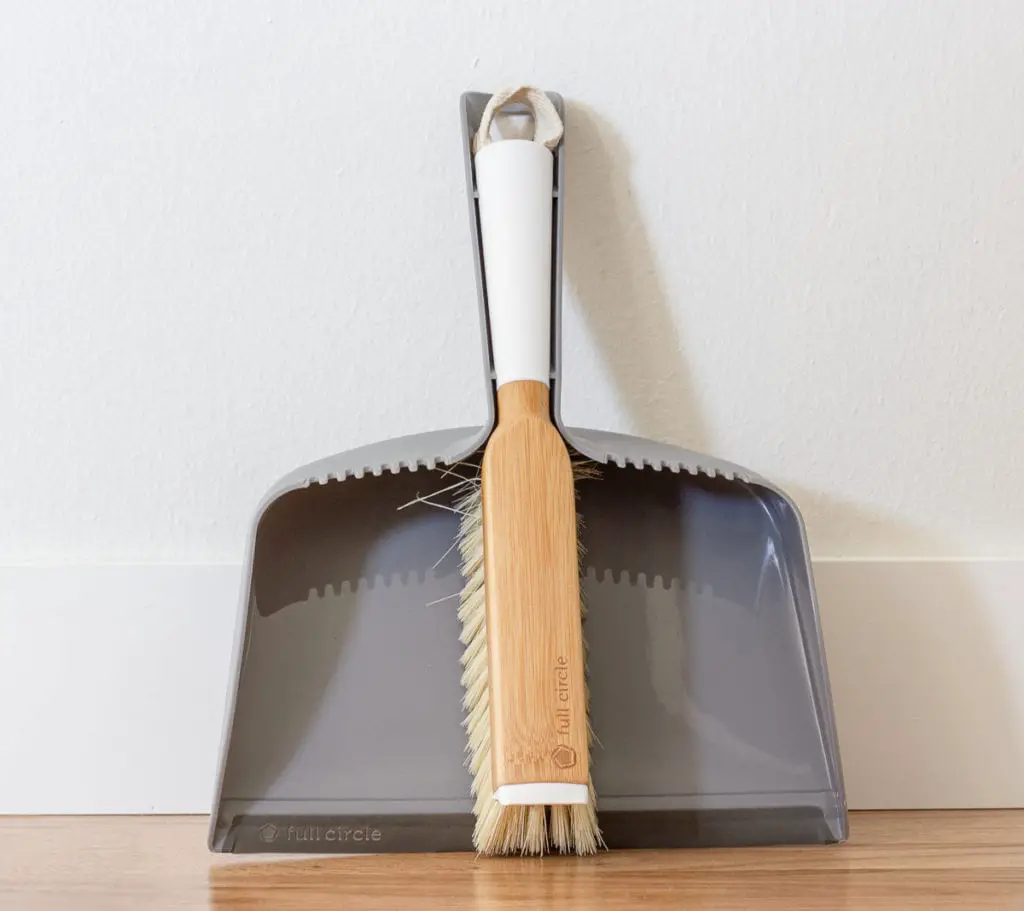
Disinfectants vs. Cleaners
Disinfectants and cleaners are not the same. Some products serve both purposes, but not all cleaners are disinfectants. Even though it is a very effective cleaning agent, white vinegar does not kill all bacteria. Please do not rely on it to disinfect.
I love this blog about Dr. Annie Pryor’s germ experiments at home. If you want to avoid bleach… here are some alternatives. Years ago, I started cleaning with these two items after reading her experiments.
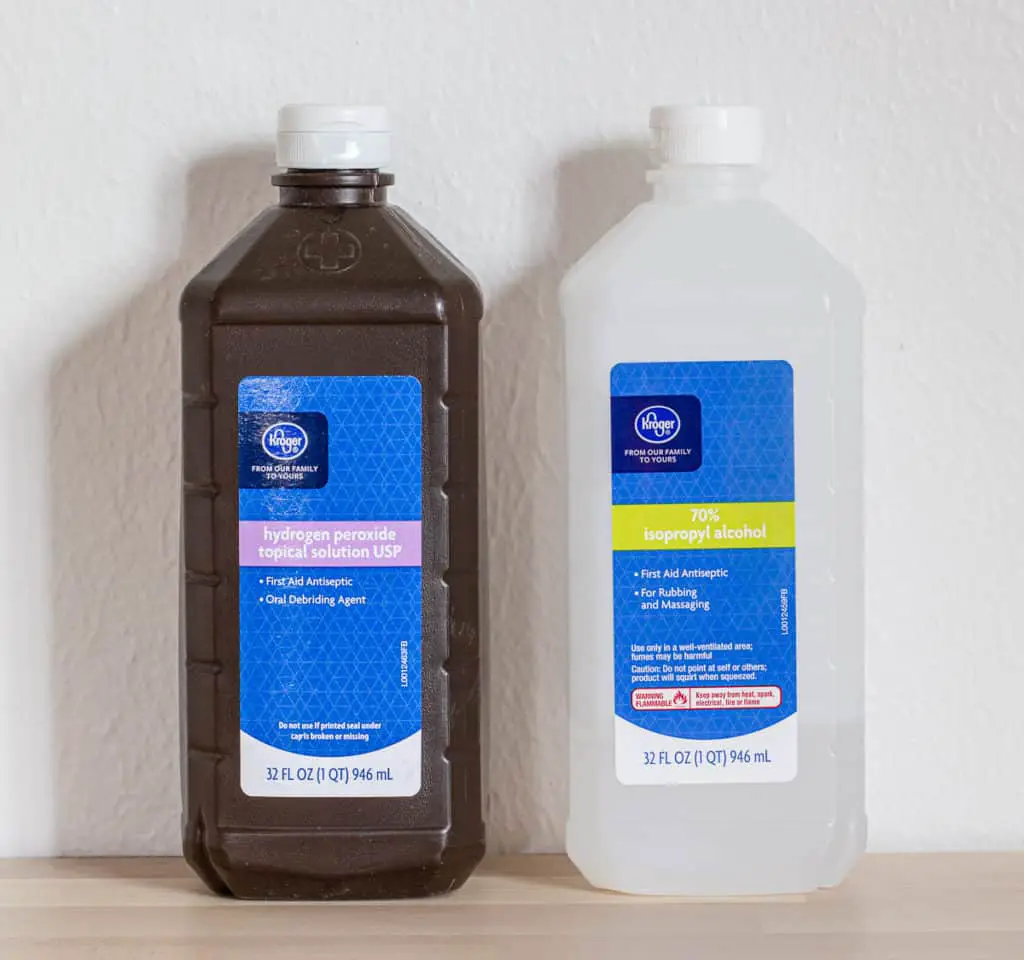
1. Hydrogen Peroxide – An affordable alternative to bleach, 3% HP can be sprayed on surfaces to disinfect. Let it sit for 5-10 minutes to work. Be careful – HP might discolor clothing or some surfaces, so spot test first. It’s not actually intended to be a cleaning product, but it’s effective at killing germs (though potentially not viruses!). Read more here. You can buy hydrogen peroxide with a spray lid online (normally here, but currently out of stock), or transfer it to a brown glass spray bottle.
2. Alcohol – Isopropyl alcohol at 70% alcohol is a pretty good surface disinfectant. (Higher alcohol concentrations evaporate too quickly to disinfect.) I have a little spray bottle filled with alcohol that I use to clean my makeup brushes. You should spot test first, and let it sit for a minute to kill bacteria.
Steam cleaning – Have you tried using a steamer to disinfect hard surface items, like toys? When my toddler caught pink eye at daycare, I realized I needed to pull out the big guns to disinfect his toys. Rather than dump everything in a bucket of bleach, we bought this handheld steamer (similar). It was pretty easy to clean a million toys and most hard surfaces in the house, and the pink eye didn’t return. I can’t promise you miracles, but it was a good investment for us.
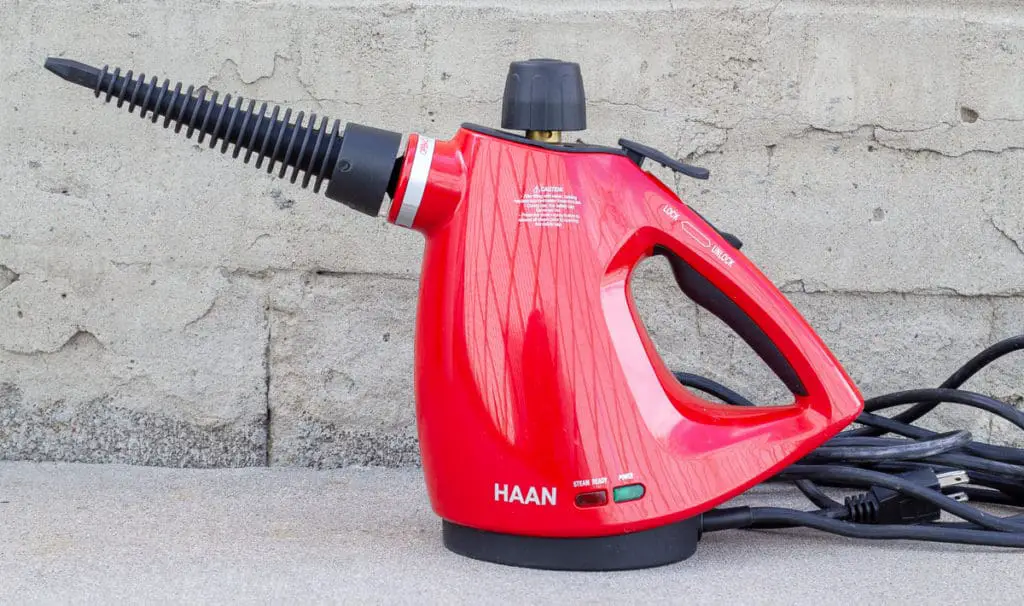
The Best DIY Natural Cleaners: Vinegar + Baking Soda
Moving on from disinfectants, vinegar + baking soda is my go-to DIY natural household cleaner. This combo works on almost everything! Scrubbing soap scum from your bathtub? Cleaning stubborn food from a delicate pan? Try white distilled vinegar and baking soda to safely dissolve the grime.
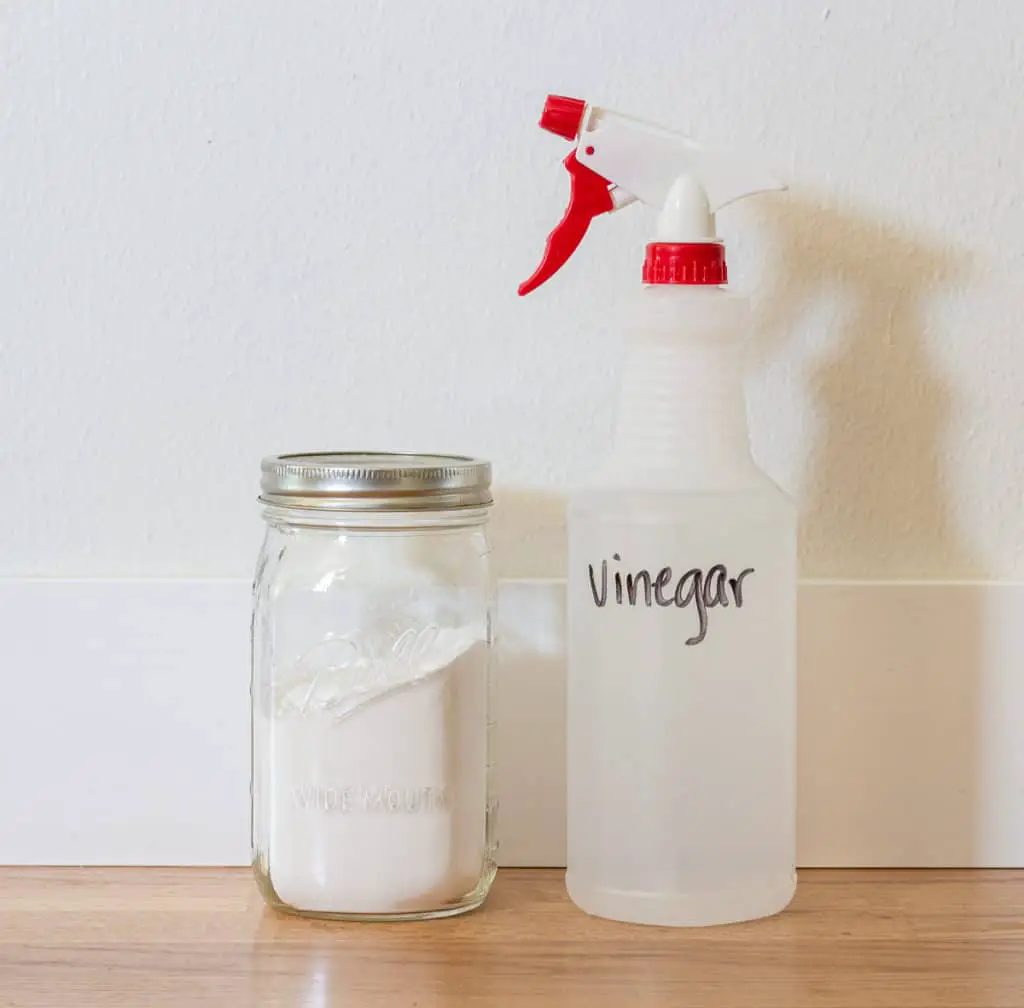
I keep a spray bottle of 50% white vinegar + 50% water under the sink. Ideally, you should use distilled water in the mix, but I’ll admit that I’m too lazy for that step.
Use vinegar to clean:
– windows
– picture frames
– glass doors
– shower doors
– sticky surfaces (cabinets, doors, etc.)
To scrub off more persistent residue, like soap scum, first sprinkle the surface with baking soda. Spray the baking soda with the vinegar solution and let it sit for a few minutes. Scrub this with hot water and then rinse. You might need to repeat these steps or let the soda + vinegar sit longer, if it’s not breaking down the residue. I also use this combo to clean our pots and pans, when food is stubbornly stuck on.
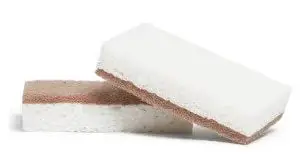
I buy a jumbo bag of baking soda at Costco and gallons of vinegar at the grocery store, but they’ll be pretty cheap wherever you shop. Also, these walnut scrubbers are nice, non-scratching, natural sponges.
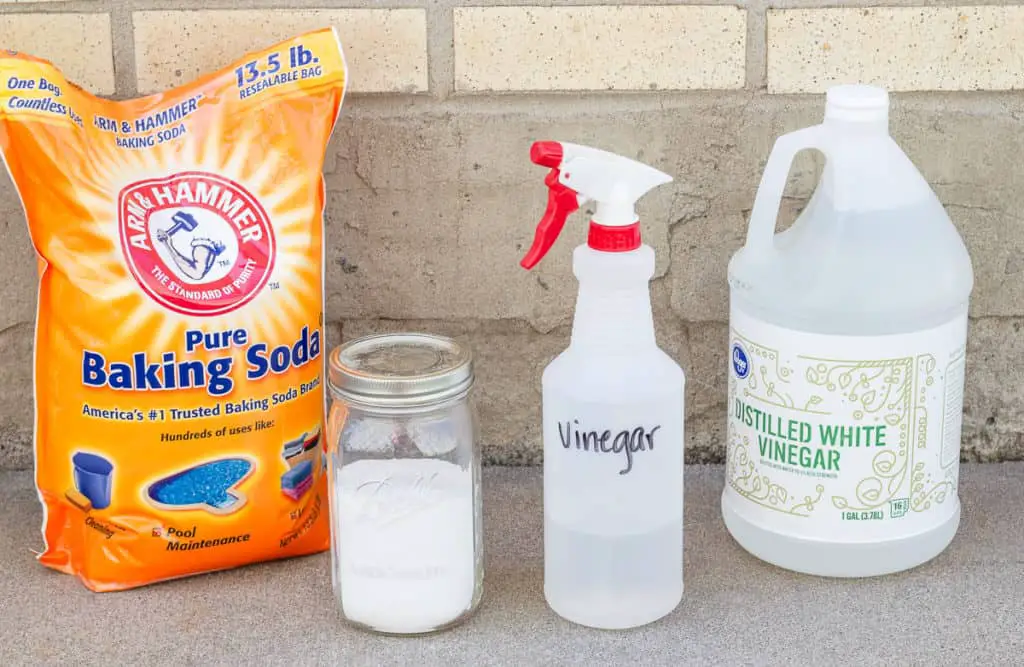
For more ideas on DIY natural cleaners with homemade products, here is a great list of recipes. Personally, I avoid DIY dishwasher and laundry detergent recipes, which I’ll explain below.
“Dawnegar”
Okay friends, I’m bringing you the best of both worlds in this post. Some of the most effective DIY cleaners are not all-natural. If you’re here because you care less about ingredients and just want affordable and effective DIY cleaners, I hope Dawn dish detergent is on your radar. Definitely non-toxic, unless you plan to drink it, the original, blue Dawn dish detergent is a powerful cleaner. Plus, have you heard of “Dawnegar” yet?
Dawn is an AMAZING degreaser. If you can live with the blue detergent in your life, you’ll save some serious cash on cleaning products. Shake up a spray bottle of equal parts Dawn and white vinegar and use this “Dawnegar” mix on soap scum. Or just squirt some Dawn detergent on top of your baking soda + vinegar mixture and scrub it together in pots, pans, sinks, tubs, etc. Rinse clean.
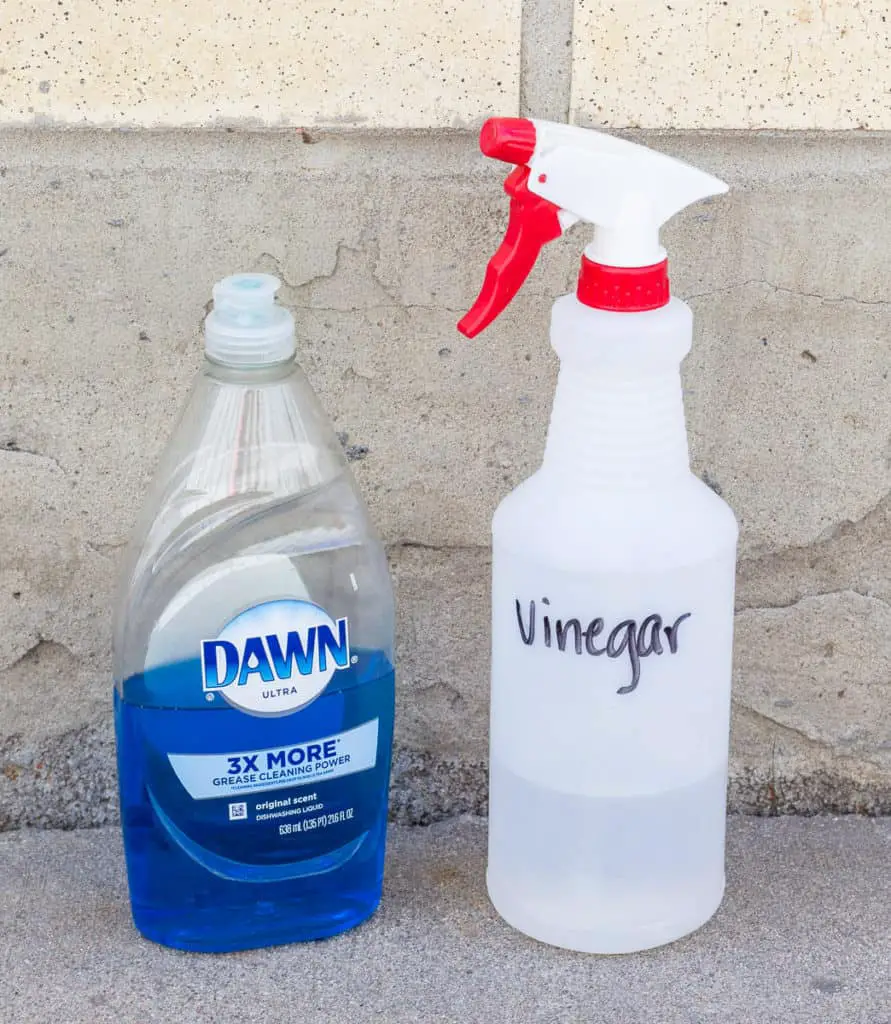
I’ve tried using other dish detergents and they work, too. Just not as well or as quickly as the original, blue Dawn. This sounds like an ad, but it’s not, and I promise “Dawnegar” is legit in the DIY cleaning world!
Less Effective DIY Natural Cleaners
Natural cleaners are a complicated category. Some cleaners are non-toxic but are not very effective. Other conventional cleaners greenwash their ingredients as natural and non-toxic. Chlorine is natural, but I don’t want to pour it on my kitchen counter, you know? Here are some of the less effective products that I’ve encountered in my research of DIY natural cleaners.
Microfiber cloths – I LOVE microfiber for cleaning, but please use a disinfectant solution if you expect microfiber to actually disinfect. This is an interesting experiment comparing different types of cloths. Norwex and E-Cloth both had less bacteria than regular cotton cloths, but neither is going to disinfect your countertop on its own (a common claim by Norwex sales reps). I have this E-cloth starter pack, but I now prefer to buy more affordable microfiber cloths, like these. I can’t tell the difference between them. Hot tip: let them air dry, or they will lose some of their absorbency in the dryer.
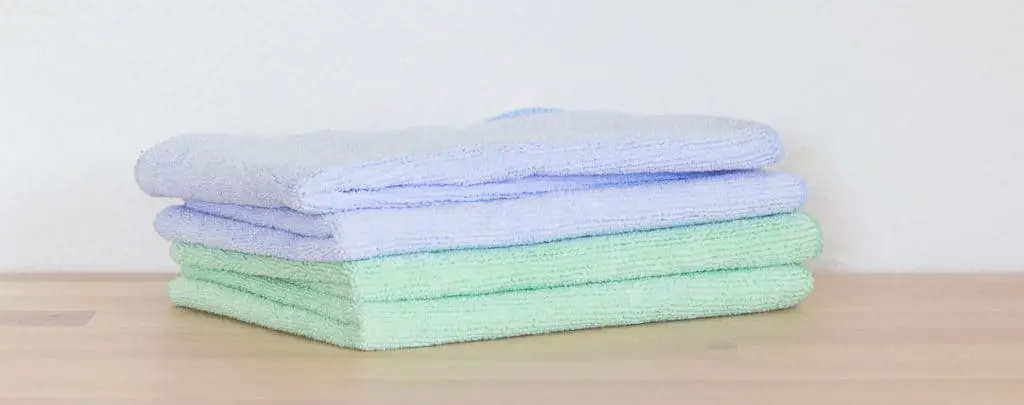
Essential Oils – Again, I’m referring to Dr. Annie’s experiments, because she shows her data and is transparent about her motives. Thieves essential oil blend is a popular essential oil that has been tested and shows germ-killing ability. Other germ-fighting essential oil blends, like doTERRA On Guard, showed similar results. However, essential oils are intended to be mixed in a solution with a carrier oil or other liquids for cleaning. They are too expensive to be poured straight onto a dirty surface, which means, once they are diluted, they aren’t as effective at killing bacteria. This makes for a pricey and impractical disinfectant, although it would smell GREAT. I’ll stick with hydrogen peroxide.
Be Cautious With Your Cleaning Machines
A word of warning. Read the fine print about your appliances before you try a cheap DIY cleaning hack. Adding vinegar to your laundry and bleach to your dishwasher are popular tricks to freshen up loads. However, I’ve also read that off-label use can damage the seals on appliances. Honestly, there’s a lot of conflicting information about this, so I don’t have an answer. I choose to buy cleaning products for both appliances, to avoid unintentional damage with a homemade cleaner.
(FYI – Here is a list of cleaning products you should NEVER MIX.)
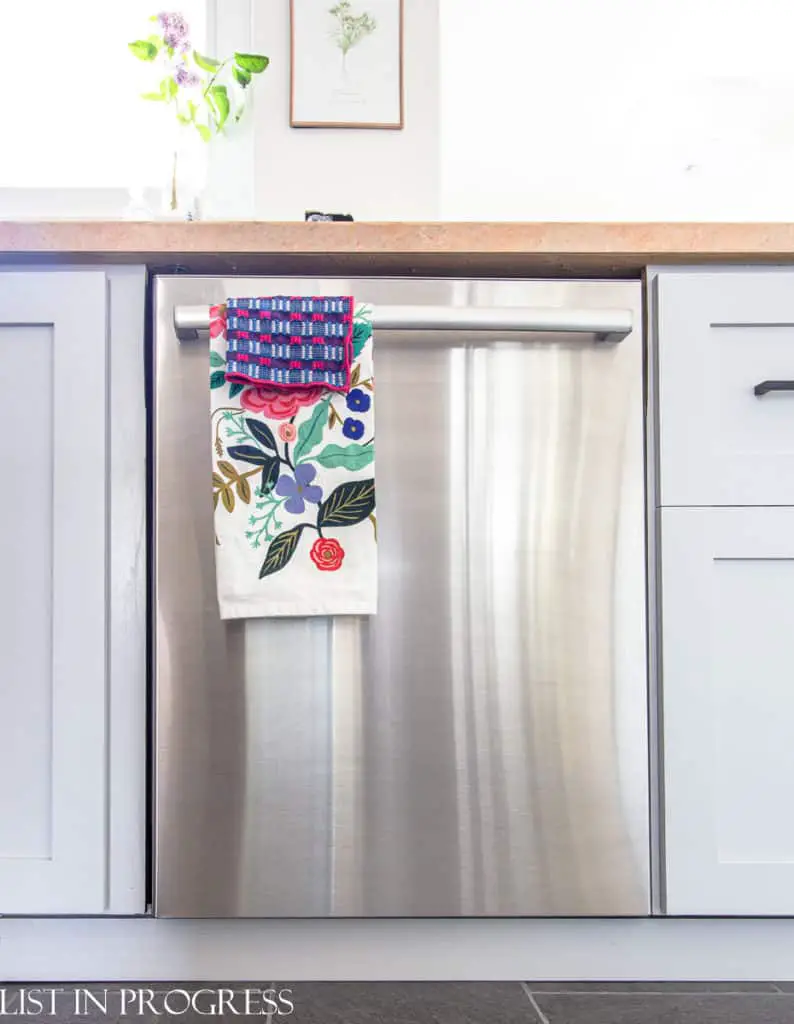
DIY Laundry Soap – Just Don’t Do It
Grate a bar of soap, mix with washing soda and borax, and boom – you can wash loads of laundry for pennies! Have you seen the catchy Pinterest graphics? They advertise how cheaply you can make your own laundry soap. Wait… soap? Or detergent? That difference is exactly the problem with this DIY natural cleaner. It’s definitely DIY-friendly and it’s affordable, but it’s NOT detergent. Our modern washing machines need detergent, and over time, your clothes will end up with a gross buildup if you DIY an alternative. Unless you’re homesteading and using an old metal washboard to scrub your clothes, don’t make laundry soap.
This blog post and this website explain exactly what I want to share on this topic, if you need more convincing. Yes, I’ve tried it, although not for long enough to ruin my clothes.
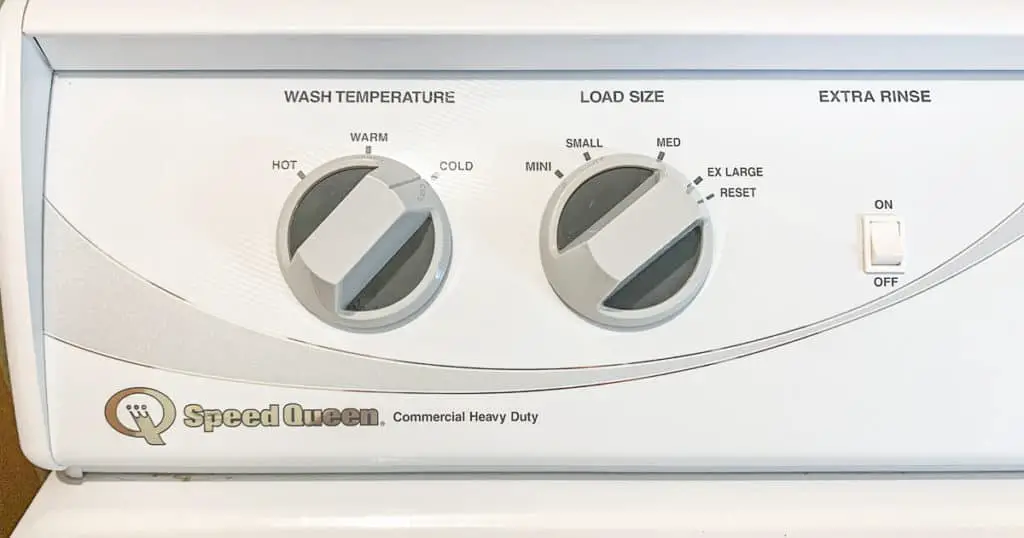
Stain removers are different territory. I love this non-toxic Poofy Organics Laundry Pre-Spray. Sometimes I reuse the bottle and mix up a little “Dawnegar” (see above) for grease stains. You can use a toothbrush and scrub a little baking soda into that mixture on fabric. I’ve also read that hydrogen peroxide can be sprayed onto stains on white fabric.
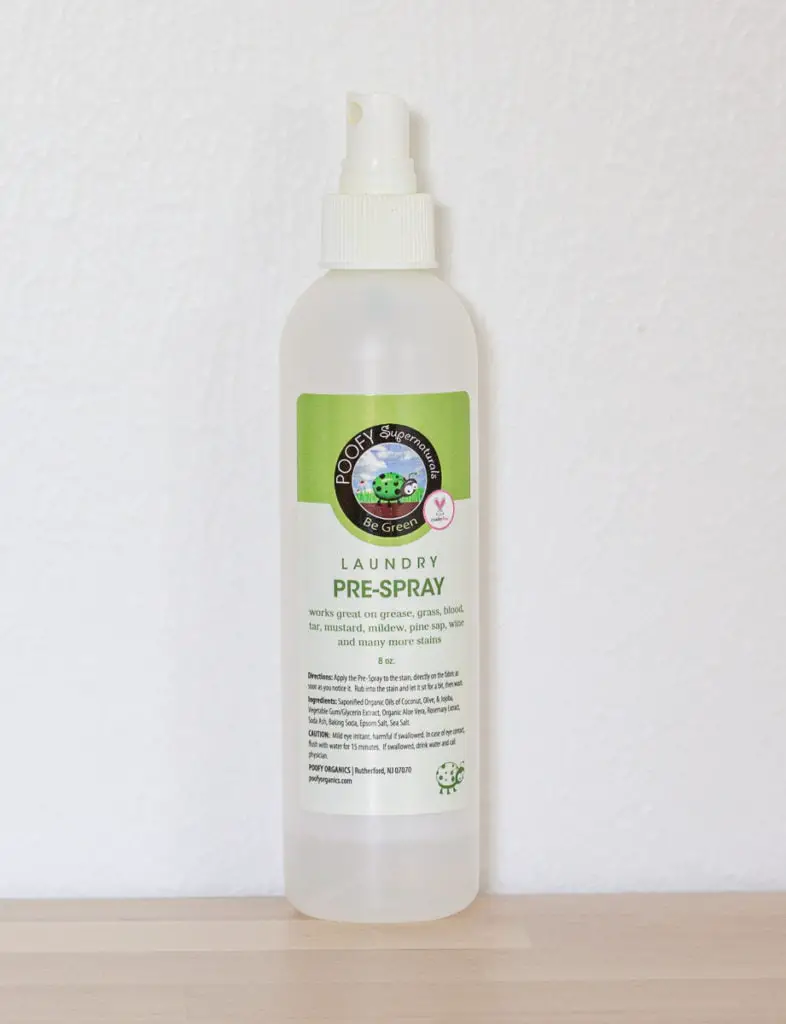
Laundry detergent is one item where I don’t bother to buy a “natural”or plant-based alternative anymore. With two little boys living their best lives, stains and all, I want the most powerful detergent I can buy. From my research, that’s Tide or Persil. I opt for unscented Persil, which I can only buy online. I’ve listed some plant-based detergents below, if that’s what you prefer.
My Favorite Natural Cleaning Products
If you’d rather not make DIY natural cleaners, here are some great cleaning products that I recommend and use. If they don’t meet your criteria for acceptable ingredients, that’s fine. I’m just sharing what I use and like.
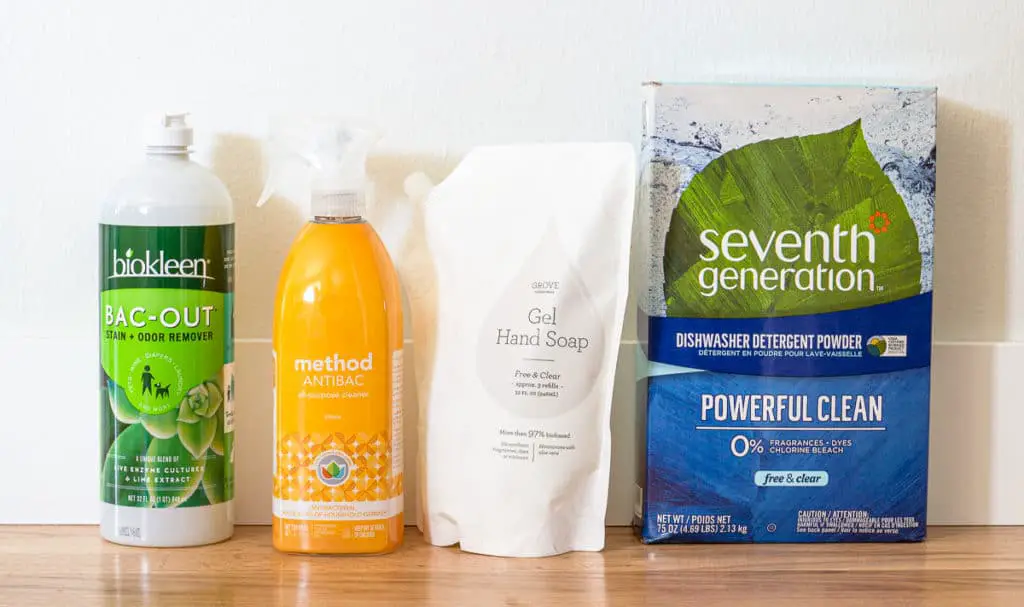
Method – I’m a fan of this entire plant-based line. Right now, I’m using this all-purpose cleaner in our bathrooms, because it smells great and doesn’t burn my lungs. It claims to be anti-bacterial if you let it sit for 10 minutes. Maybe I’ll ask Dr. Annie to test it!
Biokleen – Another good line. Bac-Out is a GREAT enzyme cleaner for pet/kid accidents on carpet and for stinky laundry. I’ve also used it in the wash to freshen up baby clothes coming out of storage and to defunk sweaty athletic shorts. You’re welcome for that beautiful imagery. Ha!
Seventh Generation – We use this powder dishwasher detergent. I’ve also read that their laundry detergent is one of the best plant-based options.
Grove Collaborative – Online retailer with a nice roundup of natural and non-toxic products. I regularly buy these sponges, bulk hand soap, bar soap, and dishwasher detergent. This is not a sponsored post; I’ve been buying Grove products for years and these are some of my honest recommendations. (I do want to share that if you join now, you’ll get a FREE Mrs. Meyer’s cleaning set with your first order over $20. This deal is how I got hooked on Grove in the first place!)
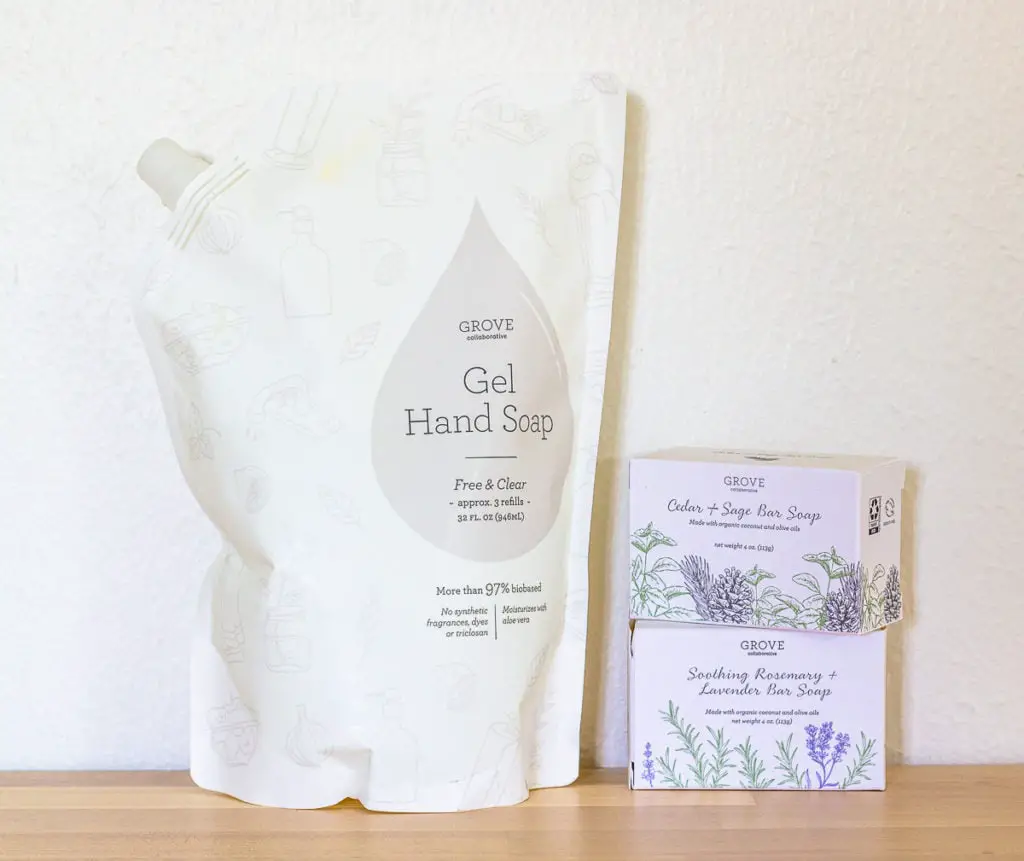
Poofy Organics – Poofy products have some of the cleanest ingredients you’ll find. Online orders only. The Laundry Pre-Spray works great on grease stains, and their liquid soap concentrate is very popular. I love this brand for personal care products, but I’m trying to stay on topic here.
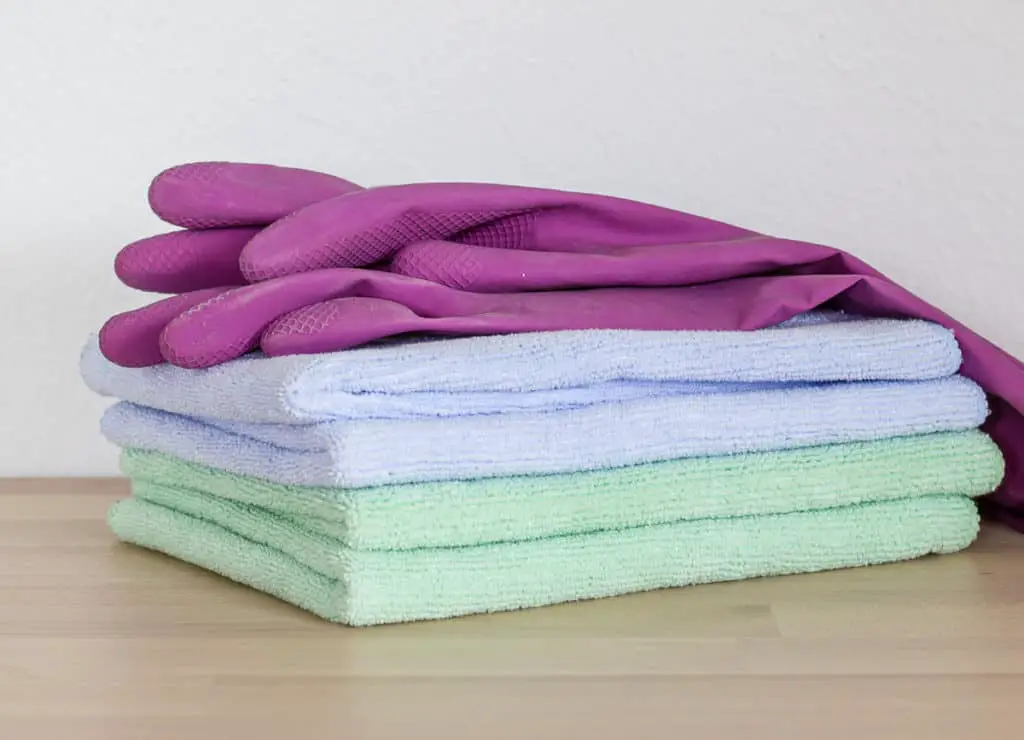
Thoughts, Suggestions, or Feedback?
What do you think of this post? Is it helpful? Do you hate it? Would you like to read more along these lines? If you have other suggestions or feedback about anything I discussed, please contribute. Leave a comment below! Thank you for reading this novel and congratulations if you made it this far. You’re the best! Now, are you inspired to start cleaning?
Want to Read More?
To read more about our recent DIY projects and other tips, check out these posts:
Tips to Help Fresh Flowers Last Longer
45 Beautiful Outdoor Rugs for Your Home
28 Doorbells and Door Knockers to Update Your Entry
Our DIY Kitchen Remodel Cost and Lessons Learned
Sources for This Post
For the Love of Clean – cleaning advice, products reviews, and the science behind it all
Dr. Annie’s Experiments – With a PdD in biochemistry, Dr. Annie “tests household products for their ability to kill or remove germs.”
CDC – cleaning and disinfection for your home


